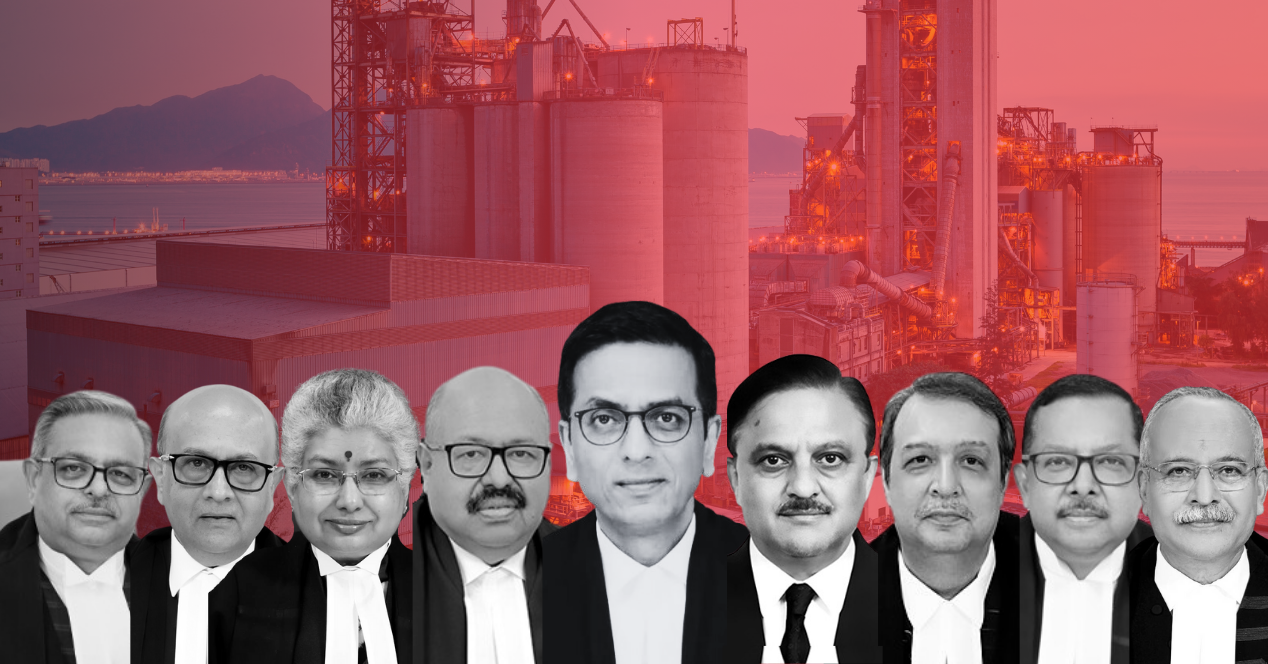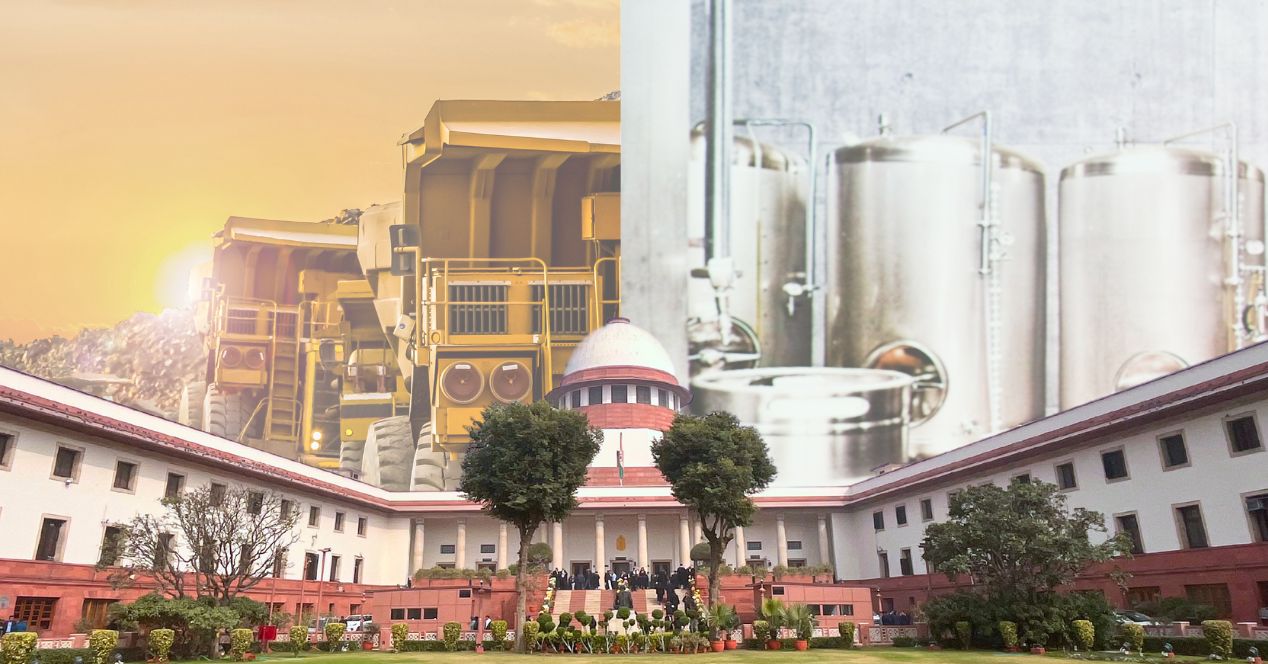Regulating Industrial Alcohol | Judgement Pronouncement: Supreme Court upholds states’ regulatory power under Entry 8 of State List
State’s power to regulate industrial alcoholJudges: D.Y. Chandrachud CJI, Hrishikesh Roy J, A.S. Oka J, B.V. Nagarathna J, J.B. Pardiwala J, Manoj Misra J, Ujjal Bhuyan J, S.C. Sharma J, A.G. Masih J
Today a nine-judge Constitution Bench, in an 8:1 majority, held that state governments have the power to regulate industrial alcohol.
Over six days in April 2024, the Bench heard arguments on whether the framers of the Constitution had intended to vest the power to regulate industrial alcohol with the Union government under Entry 52 of the Union List, or to the state governments under Entry 8 of the State List. The case also sought clarity on whether the Union or state governments occupied the field over industries under Entry 33 of the Concurrent List.
Background
Entry 8 of the State List vests state governments the power to make laws on “Intoxicating liquors, that is to say, the production, manufacture, possession, transport, purchase and sale of intoxicating liquors.” In Synthetics & Chemicals Ltd. v State of Uttar Pradesh (1990) the Supreme Court had held that “intoxicating liquors” only referred to potable (drinkable) alcohol, and that industrial alcohol (also called rectified or denatured spirit) was outside of the scope of state governments’ powers. It also interpreted Section 18G of the Industries (Development and Regulation) Act, 1951 (IDRA) to take away states’ powers under Entry 33 of the Concurrent List, citing that Parliament by declaration (law making) could allow the Union government to “cover the field” of industrial alcohol regulation. Section 18G empowers the Union to control the supply, distribution, price, etc. of certain articles in a scheduled industry for securing equitable distribution and availability at fair prices.
On 27 October 2007, a Division Bench of the Supreme Court in the State of U.P. v Lalta Prasad Vaish held that Synthetics & Chemicals wrongly interpreted Section 18G of the IDRA to remove the powers of the state legislature from Entry 33 of the Concurrent list.
The bench noted that the seven-judge bench in Synthetics & Chemicals had missed referring to Ch. Tika Ramji v State of Uttar Pradesh (1956) where the Court had held that the state’s legislative competence under Concurrent list was not ousted by Section 18G. If the decision in Synthetics & Chemicals “was allowed to stand”, it would render Entry 33(a) of the Concurrent list “nugatory or otiose.”
On 8 December 2010, after noting that the views expressed by the seven-judge bench in Synthetics & Chemicals had “been distinguished” in several subsequent decisions of the Court, a five-judge bench finally referred the matter to a nine-judge Constitution Bench.
The Court delivered two opinions in the case. The majority opinion was written by CJI D.Y. Chandrachud on behalf of Justices Hrishikesh Roy, A.S. Oka, J.B. Pardiwala, Manoj Misra, Ujjal Bhuyan, S.C. Sharma, and A.G. Masih. In her second Constitution Bench dissent of the year, Justice B.V. Nagarathna held that the supremacy of the Union in controlling industries under the Constitutional framework is both evident and crucial for the economy.
Majority Judgement: Industrial Alcohol is a part of Intoxicating Liqour
The majority overruled Synthetics & Chemicals Ltd. v State of Uttar Pradesh, a seven-judge bench decision from 1990, which held that “intoxicating liquor” under Entry 8 of the State List referred only to liquor which had an intoxicating effect, i.e. potable liquor. This limited states’ powers, and took industrial alcohol out of the scope of their control.
Eight judges held that Entry 8 of the State List was designed to cover all aspects of “intoxicating liquor”. The Entry vests state governments’ control over “production, manufacture, possession, transport, purchase and sale of intoxicating liquors,” which the majority read to mean that it included all kinds of liquor that is produced—not just drinking alcohol.
The Court also took into account states’ argument that this provision allowed them to regulate public health. States had argued that allowing them to regulate industrial alcohol would also allow them to control the illegal conversion of industrial alcohol into drinking alcohol, which has devastating health effects.
Entry 52 allows Parliament to make laws to take control of any industry “in public interest.” The Court recognised that this overlaps with Entry 8 of the State List, with both entries made with a strong public interest element. The Court noted that the two Entries must be read harmoniously, such that both are given effect. The majority held that if Entry 52 of the Union list is read to give the Union complete control over industrial alcohol, Entry 8 would be rendered redundant. Harmonious reading, therefore, would require that the specific scope outlined in Entry 8 of the State List is given precedence over Entry 52 of the Union List.
The Court was also tasked with deciding whether the Industries (Development and Regulation) Act, 1951 meant that Parliament had “declared” its control over industrial alcohol. Section 18G of the IDRA stipulates that the Union government may take control of supply, distribution, price, and other aspects of certain articles “by notified order.” States had argued that no such notified order existed, leaving the power of regulation with the States. The Union had argued that this was a “deliberate, conscious, intentional policy choice of non-interference” or “governance through forbearance”. It did not mean that the Union had relinquished its control. They argued that the IRDA itself was a “notified order,” which expressed the Union’s claim of power over industrial alcohol. The majority found no reason to engage with this aspect of the case in light of their decision that states’ power came from Entry 8 of List II, not from the Union’s silence in Entry 52 of List I.
Dissenting opinion
Justice Nagarathna stated that she had written a “lengthy judgement” with nine reasons for why the Court was right in holding that states do not have control of industrial alcohol, as intoxicating liquor referred only to potable liquor. All nine reasons will be explained in our Judgement Summary, with key highlights from the pronouncement hearing here.
On the definition of intoxicating liquor, Justice Nagarathna held that it was long established that intoxicating liquor meant potable liquor. She focused on the nature of the product and its effects and the literal and direct meaning of “consumption” of intoxicating liquor.
Next, Justice Nagarathna held that Entry 8 of the State List cannot be “stretched” to include industrial alcohol because there is scope for misuse of the product. She pointed out that there was no framework that gave states the power to regulate industrial alcohol as per IRDA, adding that ancillary matters cannot be “entered in through the backdoor.” While the mischievous use of industrial alcohol for illegal consumption would fall under Entry 8 of the State List, she wrote that industrial alcohol itself fell under the Union’s control.
On the doctrine of occupied field and the need for a “notified order” she agreed with the Union government that the IRDA itself was the legislative expression of Parliament’s intent to control industrial alcohol. She held that Ch. Tika Ramji v State of Uttar Pradesh (1956) was wrong to the extent of holding that if the field is not occupied by the Union, it means that the state government can come in to stake their claim.
Justice Nagarathna also took time to highlight the need for industrial alcohol to be under the Union’s control. She noted that industrial alcohol is a key player in the chemical industry in India and that it is a critical part of India’s plan to increase its reliance on Ethanol Blended Petrol. In these matters, where a comprehensive strategy is required, the importance of Union’s control cannot be ignored, she said.
Happy Hour
Concluding a series of jokes that Justice Hrishikesh Roy had made during the course of the hearings (including one about a drunken bee), he closed the pronouncement today by saying to the winning side “happy hour begins now.” Solicitor General Tushar Mehta added that the losing side needed it too. “Yes, but don’t lose control either way,” Justice Roy replied.



